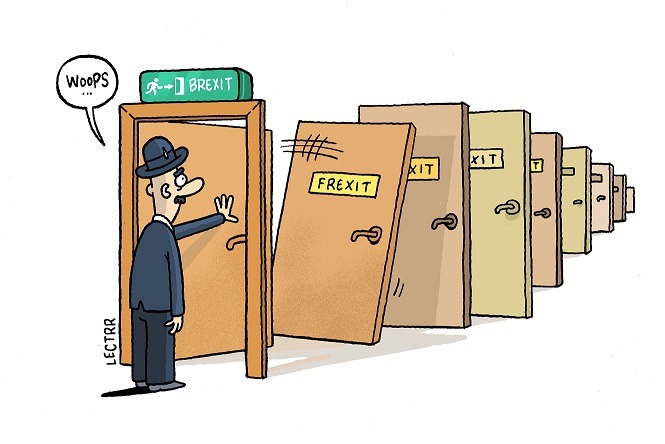When Hitler invaded Poland in September 1939, Britain and France immediately declared war on Germany. But for eight months afterwards, there was no significant fighting on the Western Front. During this Phoney War, everyone knew conflict was coming, but it hadn’t properly started yet. The situation with Brexit is somewhat similar. Since Britons’ shock vote to leave the European Union on 23 June, there has been some bloodletting, mostly within Britain’s ruling Conservative Party. The prime minister who lost the peace, David Cameron, has fallen on his sword. So has his EU emissary, Jonathan Hill. After her various rivals self-destructed, Theresa May has emerged as the UK’s tough new wartime leader. She has appointed new generals, some more impressive than others.
Battle lines have been drawn. Germany’s Chancellor, Angela Merkel, has set out her position, as has France’s president, François Hollande. Michel Barnier, a suitably steely Frenchman, has been tasked with leading the European Commission charge. He will square up against two Brexiteers, foreign secretary Boris Johnson and Brexit secretary David Davis. But the two sides have yet to engage meaningfully.
Meanwhile, German car exports and British financial contracts continue to cross the Channel unimpeded. Poles still pull pints in London pubs. British pensioners go on visiting Spanish doctors for free. And Britons still toil away in the Commission and other EU institutions. On the surface, nothing much has changed. And yet everything has changed.
Brexit is not just a disaster for Britain; it is potentially of huge significance for the rest of Europe. A massive strength of EU integration is that it seemed inevitable. The tide of history was on its side. It might pause, but it didn’t retreat. Countries queued up to join; none left. No longer.
Old-fashioned federalists comfort themselves that Britain was never wholly committed to the European project, which is true, and that its departure will actually bring Europe closer together - which isn’t. While British attitudes to the EU are in some ways unique, the backlash against the EU isn’t just a British phenomenon; it’s much bigger and broader than that.
It’s a backlash against particular policies, such as the forcible relocation of refugees across the Union and the imposition of excessive austerity in the eurozone; the latter results in an overreliance on monetary policy to keep the economy afloat, provoking a further backlash in Germany. It’s a backlash against some of the fundamental principles of the EU, such as the free movement of people, with immigrants unfairly blamed for all manner of ills. It’s a backlash against German dominance, which Brexit will exacerbate.
It’s a backlash against self-serving European elites – the bankers who blew up the economy and the politicians who bailed them out – and remote, unaccountable and often incompetent EU institutions. And it’s a backlash against the very idea of European integration and the open, liberal societies that it has nurtured, fuelled by a resurgent nationalism that hates the blurring of borders and identities and wants to reassert national control. While some of the backlash is driven by the genuine flaws of the EU, it is also a manifestation of broader fears: of foreigners and of the future.
Brussels is the ultimately complacent town. EU commissioners are appointed, not elected. EU officials have jobs for life. Many members of the European Parliament are elected on party lists, giving them secure tenure too. They all tend to be surrounded by sycophants who suck up to them for money and influence. From this Brussels bubble, the revolting barbarians in the provinces seem like a distant threat.
But they aren’t. The new narrative in Europe is one of disintegration. The big questions are how, how fast and how far the EU might unravel, not which Brussels institution can grab more deckchairs on the Titanic.
Exiting the EU is no longer a fantasy for extremists; it is real and, to many, seems reasonable. Anti-EU parties are on the march – and increasingly in power. Discredited establishment parties seem incapable of responding, save to trim their sails to the populists’ demands. Meanwhile the EU is collapsing from within, its rules and norms increasingly defied and ignored. The eurozone’s (wrong-headed) fiscal rules are bent. Its new bank bail-in rules look likely to fail their first Italian test. The Schengen area of open borders is in tatters. Hungary, Poland, Slovakia and others openly defy EU norms of liberal democracy, not to mention the EU’s refugee-relocation requirements.
Consider the agenda for the next few months. The weak eurozone economy is likely to slow further as Brexit-related uncertainty provides businesses with yet another reason to delay investment. Economic hardship, in turn, will fuel political anger.
In October, Austria stands a good chance of electing a far-right president. Hungary’s increasingly illiberal and autocratic prime minister, Viktor Orban, is likely to win a referendum he called to bolster his refusal to comply with the EU’s refugee-relocation programme, which is in any case ineffective.
The following month, Italy’s prime minister, Matteo Renzi, risks losing his own referendum on constitutional reform. That could prompt early elections, which the anti-establishment Five Star Movement is well placed to win. It has promised a referendum on Italy’s euro membership – a hard sell in a country whose economy has stagnated since it joined the single currency.
Next March, the Netherlands holds legislative elections. Geert Wilders’ far-right Freedom Party is leading in the polls, though not heading for a majority; he is demanding a referendum on Nexit (Netherlands exiting the EU).
France’s presidential elections are in April and May. Marine Le Pen, the leader of the far-right Front National, looks set to top the first round of voting. With the country gripped by terrorism fears and economic insecurity, it is no longer inconceivable that she could win the second-round runoff. One of her key promises: a plebiscite on Frexit. Former president Nicolas Sarkozy, potentially her second-round rival, may also promise a Frexit referendum to woo EU-sceptic voters. And according to a recent Pew survey, the EU is even more unpopular in France than in Britain.
Even if anti-EU parties are kept of out power, the pressure to bow to their demands will grow. Alain Juppé, Sarkozy’s leading rival to be the Republicans’ president candidate, has talked of revisiting free movement within the EU. France’s current prime minister, Manuel Valls, threatened to ignore the EU’s posted-workers directive unless it was reformed to prevent EU workers being paid less than local ones. How long before protectionism impinges on the single market too?
The belief that the centre will always hold is complacent. People in Brussels thought Brexit couldn’t happen; it did. They shouldn’t make the same mistake twice.
By Philippe Legrain


